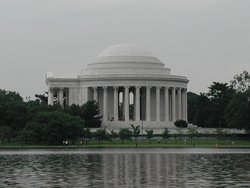John Russell Pope
|
|

John Russell Pope (April_24, 1874 - August 27, 1937) was an architect most known for his designs of the Jefferson Memorial (completed in 1943) and the West Building of the National Gallery of Art (completed in 1941) in Washington, DC.
Pope was born in New York in 1874, the son of a successful portrait painter. He studied architecture at Columbia University and graduated in 1894. He received a scholarship to attend the newly-founded American Academy in Rome, a training ground for the designers of the "American Renaissance." Pope travelled for two years through Italy and Greece, where he studied and sketched and made measured drawings of more Romanesque, Gothic, and Renaissance structures than he did of the remains of ancient buildings. Pope was one of the first architectural students to master the use of the large-format camera, with glass negatives. Pope attended the Ecole des Beaux-Arts in Paris in 1896, honing his Beaux-Arts style, returning to New York in 1900, to spend a few practical years in the office of Bruce Price before opening a practice.
Throughout his career, Pope designed private houses (including for the Vanderbilt family: see Vanderbilt houses), and other public buildings besides the Jefferson Memorial and the National Gallery, such as the massive Masonic Temple of the Scottish Rite (1911 - 1915), also in Washington, and the triumphal-arch Theodore Roosevelt Memorial at the American Museum of Natural History in New York City. In 1919 he provided a master plan for the future growth of Yale University, one that was significantly revised by James Gamble Rogers in 1921 with more sympathy for the requirements of the city of New Haven, Connecticut, but which kept the Collegiate Gothic unifying theme offered by Pope. Pope's original plan is a prime document in the City Beautiful movement in city planning.
JRPNational-Archives.jpg
Pope's designs alternated between revivals of Gothic, Georgian, eighteenth-century French, and classical styles. The Jefferson Memorial and the National Gallery of Art were both neoclassical, modelled by Pope on the Roman Pantheon.
Less known projects by Pope include Union Station, Richmond, Virginia (1919), with a central rotunda capped with a low saucer dome, now housing the Science Museum of Virginia; Baltimore Museum of Art; and in Washington the Masonic Temple of the Scottish Rite (1911-1915), Constitution Hall, Pharmaceutical Building, and the National Archives Building (illustration, left). In Milwaukee, Wisconsin he provided a severe neo-Georgian clubhouse for the University Club (1926). He designed additions to the Tate Gallery and British Museum in London, an unusual honor for an American architect, and the War Memorial at Montfaucon, France.
In 1991 an exhibition at the National Gallery of Art, "John Russell Pope and the Building of the National Gallery of Art" spurred the reappraisal of his work, which had been scorned and derided by the critics of International Modernism.
External links
- Steven McLeod Bedford, John Russell Pope: Architect of Empire (http://www.library.yale.edu/archives300/exhibits/building/part1/page1.htm) e-text of introduction, outlining the curriculum of academic American instruction in architecture
- University Club, Milwaukee (http://www.bluffton.edu/~sullivanm/wisconsin/milwaukee/pope/university.html)
- Yale University plan, 1919 (http://www.library.yale.edu/archives300/exhibits/building/part1/page1.htm)
- Alpha Delta Phi at Cornell, John Russell Pope, architect (http://www.adphicornell.org/adphicor/Archives/2000s/Alpha-Delt-house-2003.jpg)
